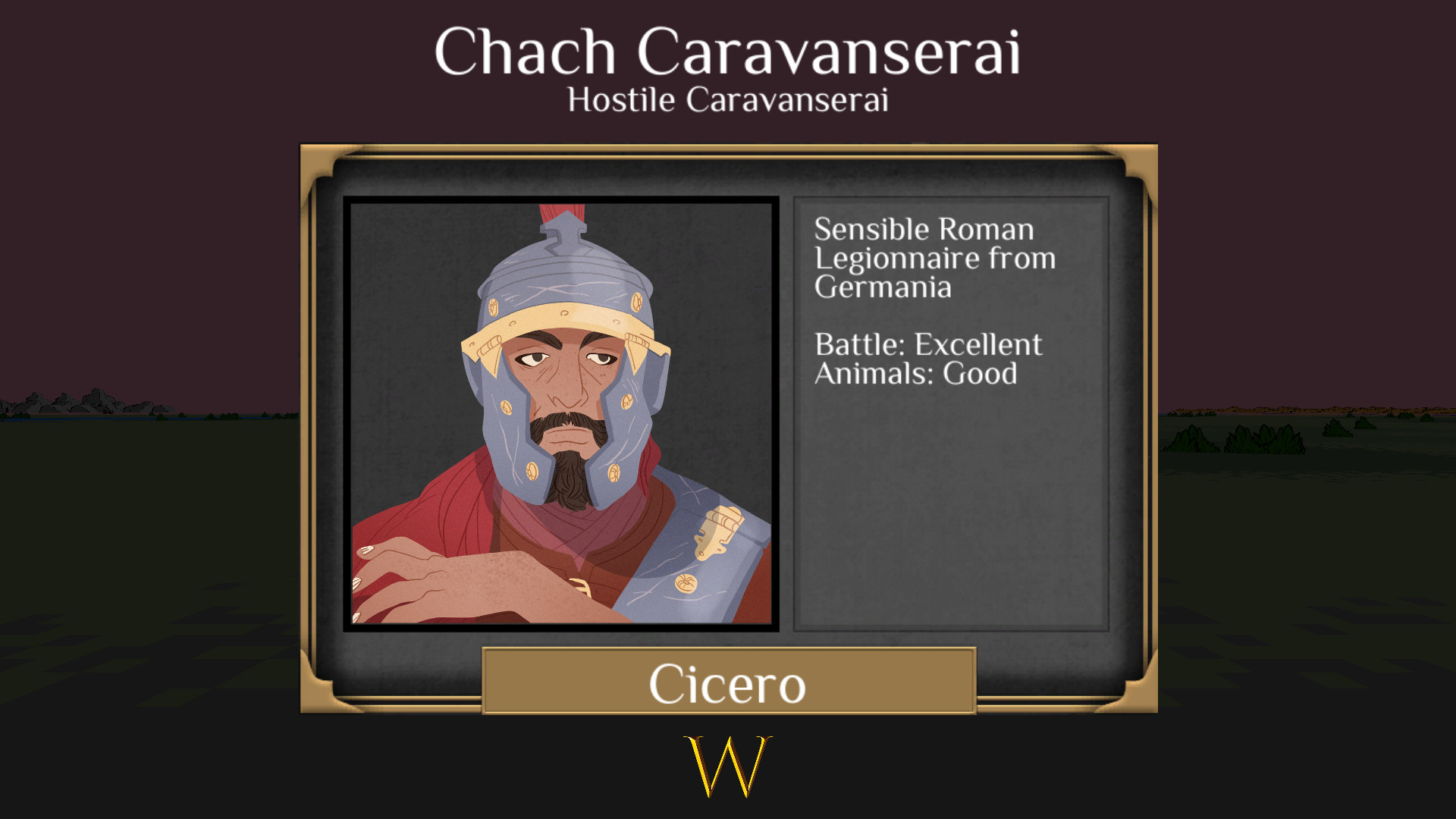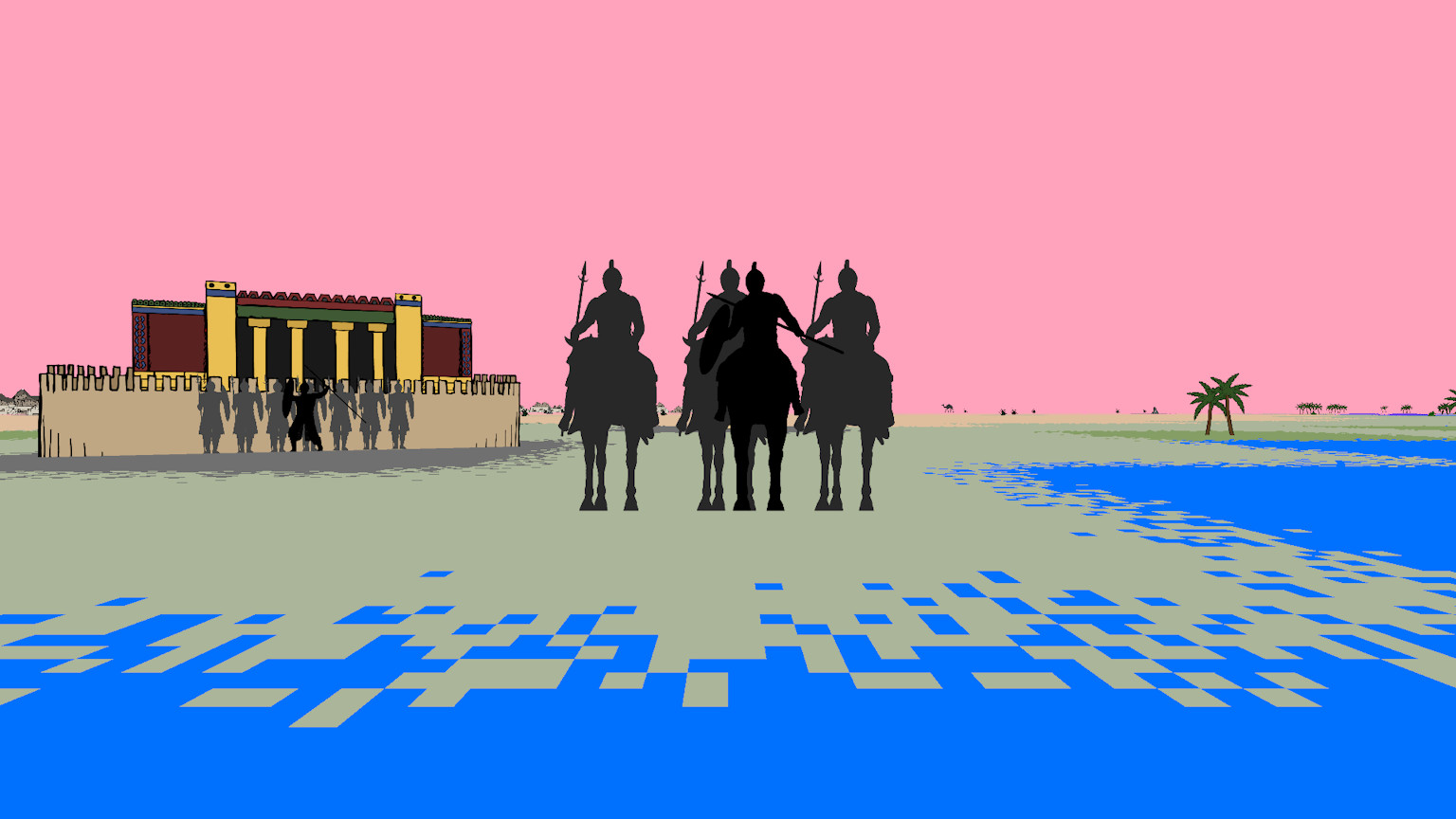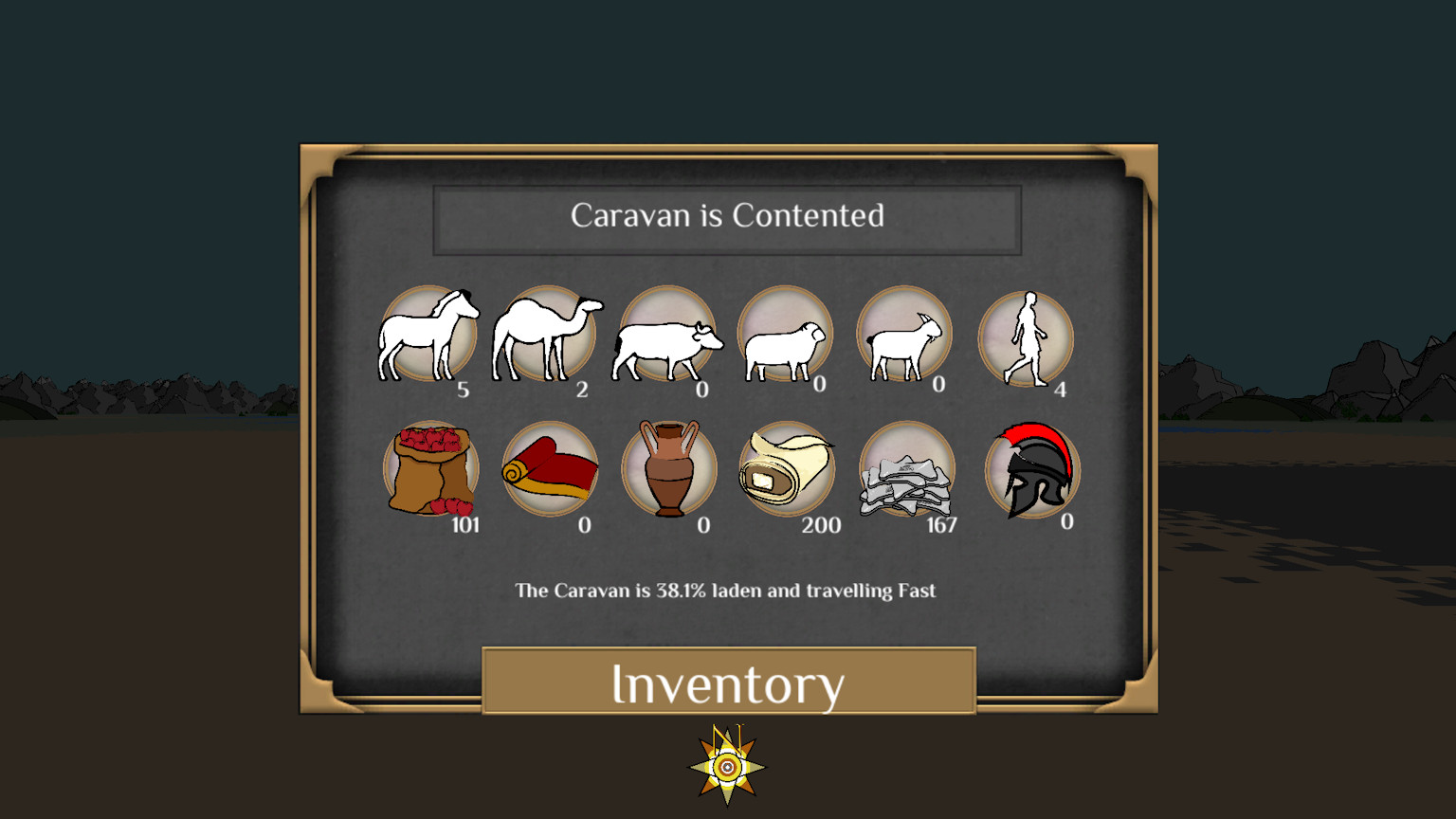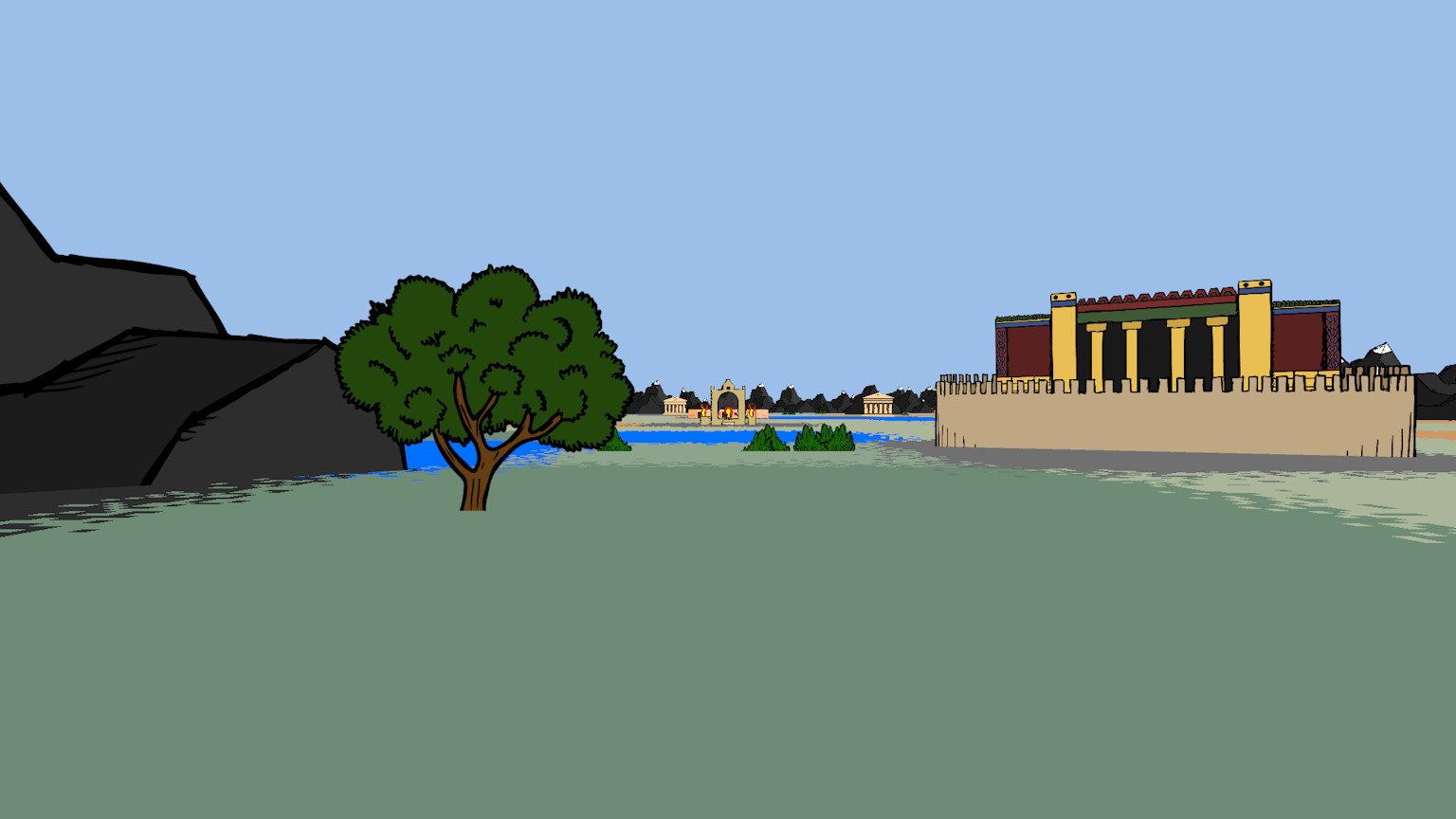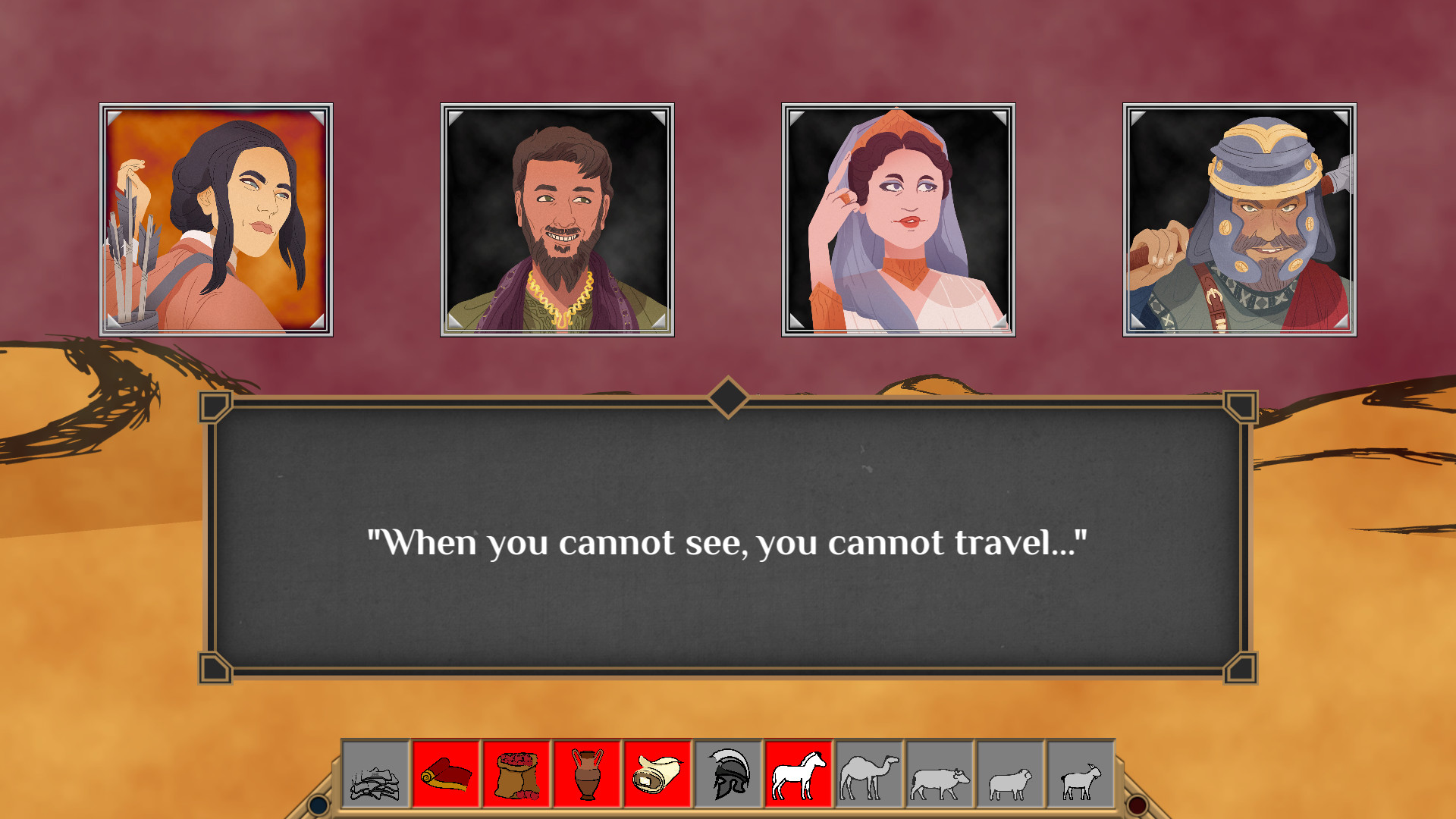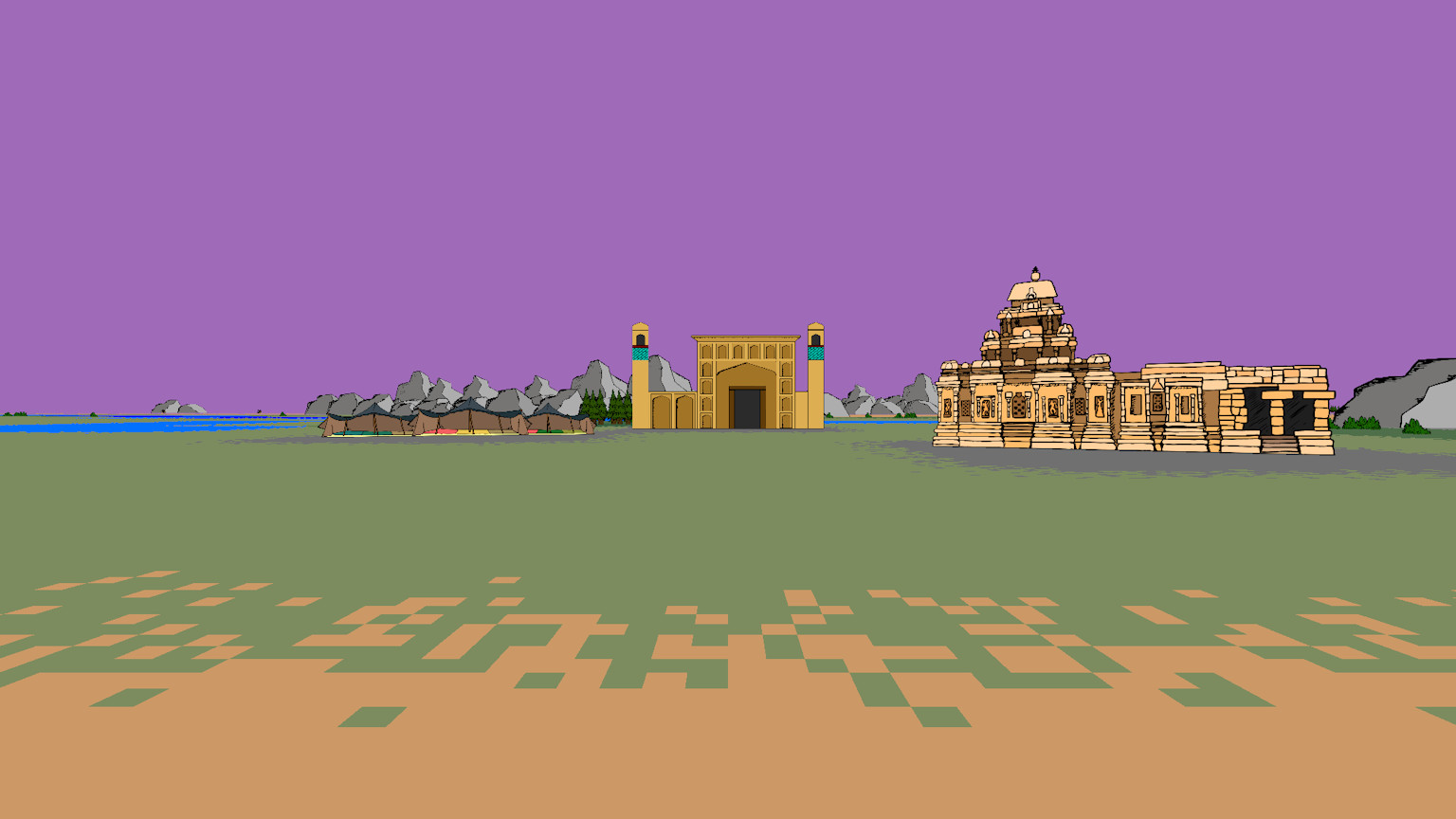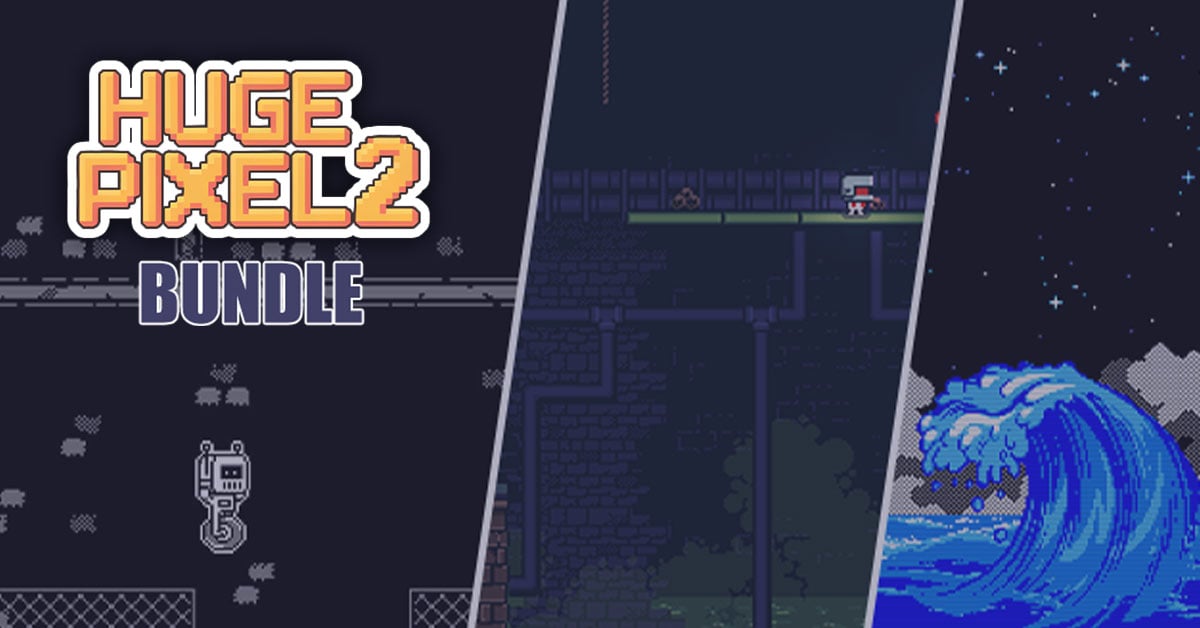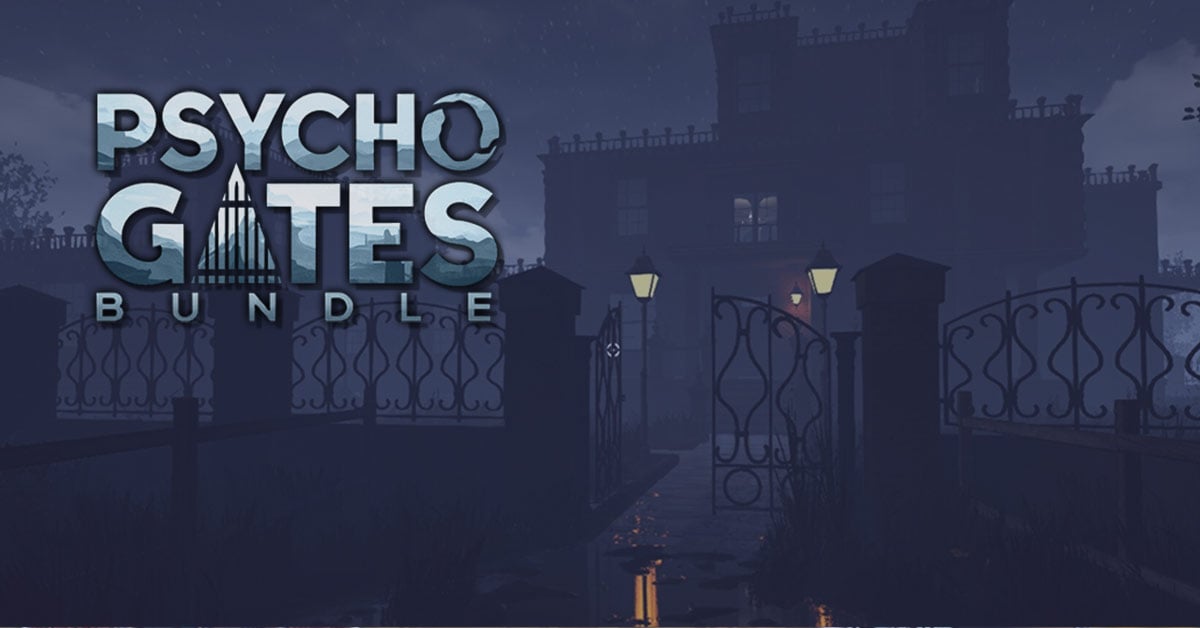From a parallel dimension where they still make keyboard-controlled, square-based RPGs in 2019 comes the new game from Chris Bateman (Discworld Noir, Ghost Master, Heretic Kingdoms). Can you puzzle out the secrets of the four distinct challenges await you in Silk?
- Explore the vast expanse of the Silk Road in an epic journey across dangerous wilderness as The Traveller.
- Overthrow Rome's greatest enemy, the powerful Parthian Empire, as The Rebel.
- Master the art of raiding to capture the fortunes of rival kingdoms as The Warlord.
- Carve out a trading empire between the brutal battlegrounds of the Silk Road as The Noble.
- Level up any seven of the thousands of Advisors in the game as you hire your perfect party, each of which unlocks hundreds of unique choices in the world
- Battle, Trade, or Explore: play the game your way as you amass a well-provisioned caravan or build your own renegade army
- Discover the lost genre of tile-based RPGs (Eye of the Beholder, The Bard’s Tale) remastered for the twenty first century
 We are thrilled to report that Silk has picked up two nominations in this year's TIGA Games Industry Awards, one for Best Role Playing Game and one for Heritage in Games.
We are thrilled to report that Silk has picked up two nominations in this year's TIGA Games Industry Awards, one for Best Role Playing Game and one for Heritage in Games.
Silk is our homage to classic square-based exploration videogames of the 1980s, and a personal tribute to the late Mike Singleton, whose game The Lords of Midnight was a classic of the 8-bit era that doesn't receive the praise or recognition it deserves. In paying tribute to Mike's work, and creating an entirely new style of play riffing off his 'landscaping' visual rendering system (which is reproduced - in a slightly modified form - in Silk), our game is expressly intended to be a contribution to the great heritage left to us by the British Bedroom Coders, and to be nominated for a award that recognises what we were trying to do here is a genuine honour.
We're not expecting to win given the tough competition in each category, but as fellow nominee Jon Ingold of Inkle said to us on the day the news broke: "nominations ARE a win". We couldn't agree more.

The new v1.6 build of Silk is out now in the Beta branch! This adds our two most requested features - holding a key to keep moving in that direction, and the option to camp wherever and whenever you like. Just press Enter when you reach the place you want to camp and choose 'Yes' in the popup window.
To access the Beta branch, select 'Properties' on the right click menu for Silk on Steam, go to the Betas tab, and 'Check Code' with nothing in the box. The Beta branch is now available in the dropdown menu.
May every journey be safe from storms!

You can now download the complete Silk Landscape Map from this link, or by right clicking the above image and saving it. It doesn't have any text labels - you have to chart your own journey! - and it does contain spoilers. But if it was the 80s, a magazine would have given you a map by now, so we felt it was time to give you this one.
Coming soon: v1.6, with some of the most requested features, like 'camp on demand'. Watch this space!
We're pleased to announce that the winner of the competition to be the first player in the world to complete Silk is Sebastien Chaume, who lives in Orlans, France. He not only beat all four Destinies, but completed each of them with 100% Mastery to claim all the Steam trophies as well. His final Destiny was the Rebel - notoriously hard to beat! - but he eventually overcame the Parthians to claim victory and his prize.
 ihobo games congratulates Seb on his victory! He has already received his prize, a Limited Edition Retro-USB Cassette with exclusive making-of features.
ihobo games congratulates Seb on his victory! He has already received his prize, a Limited Edition Retro-USB Cassette with exclusive making-of features.
 We are releasing the current beta branch of the game, which includes a few small bug-fixes, primarily relating to the Temple of Celestial Horses, outside of Khujand in the Kushan Empire. There was a bug preventing sacrifices here counting for the task in the Traveller's Destiny, preventing getting 100% in this Destiny. Thanks to everyone who helped out in fixing this bug!
We are releasing the current beta branch of the game, which includes a few small bug-fixes, primarily relating to the Temple of Celestial Horses, outside of Khujand in the Kushan Empire. There was a bug preventing sacrifices here counting for the task in the Traveller's Destiny, preventing getting 100% in this Destiny. Thanks to everyone who helped out in fixing this bug!
We'd like to remind everyone that there is no password on the beta branch, so feel free to opt in using the settings in Steam if you want to have the most up-to-date version of the game.
Need a little help with your hiring? This Advanced Advisor Guide has your back.
The old Beta Branch has now been made live; this fixes a number of small but fatal bugs in Nomad settlements on the far east of Takla Makan. A new Beta branch will be going up in the next few days which fixes a few script bugs recently reported.

You can win one of these exclusive, Limited Edition Silk USB drives, previously only available to high-tier Kickstarter backers, in a special competition for all Silk players! The Limited Edition USB drive will never be available to buy again, and is one of only seventy that were made, each valued at $50.
The Limited Edition Retro USB is styled to look like a 1980s videogame cassette, and contains:
- Silk game files for Windows, Mac, and Linux, DRM-free
- Unique cover image which shows the development team as characters in the world of Silk (left to right: Becky (Portrait Artist), Patrick (Producer), Jamie (Artist), Nathan (Programmer), Chris (Designer/Writer)
- Silk Original Sound Track album by composer Chris Shutt, also DRM-free
- Silk Manual and Almanac PDF
- Silk Videos - a collection of videos shot for the Kickstarter, including all sorts of footage that isn't available anywhere else
- Silk Project Files - the complete collection of all the files used by the development team in making the game, including the final Core Design document and all its development stages, artwork, Excel level editor, maps, scripts, reference images, landscape maps, and more beside.
- Custom Obi strip styled after a silk bolt
- Full body cassette printing with UV highlights on the logo
To claim the prize, you should submit the following screenshots for each victory:
- Victory screen, showing days at time of victory
- Inventory (North), showing your winning caravan
- Hero (North East), showing your starting character's final skills
- Map, showing your complete journey for that Destiny
Note that ihobo games reserves the right to ask follow up questions of the winner to confirm that they haven't been faking it... victory means nothing without honour.
Good luck, and may your nightfall not be troubled by storms!
ihobo games
 So you like to think of yourself as a gamer who can beat any game... But you haven't beaten Silk. Maybe 1% of gamers are going to beat this game - maybe 1% of those are going to 100% it (and then complain that the game is 'too easy'!). That's because beating Silk doesn't just require quick reactions and stubborn persistence... it requires players who can think - smart, shrewd players able to rise to a mental challenge like no other.
So you like to think of yourself as a gamer who can beat any game... But you haven't beaten Silk. Maybe 1% of gamers are going to beat this game - maybe 1% of those are going to 100% it (and then complain that the game is 'too easy'!). That's because beating Silk doesn't just require quick reactions and stubborn persistence... it requires players who can think - smart, shrewd players able to rise to a mental challenge like no other.
The Traveller
Anyone can win the Traveller, the first of the four Destinies in the game, but that doesn't mean it's easy. You're going to need several skills just to have a hope of getting across the three million square miles of wilderness that makes this the biggest hand-crafted open world of all time.- History: you're going to need either a little bit of historical geography or a willingness to learn it (the Manual and Almanac has your back here) if you're going to find your way.
- Geography: are you one of these smartphone cyborgs whose concept of navigating is to ask your robot to plot a route on Google maps? That's not going to help you here. You have to be able to navigate with a map and compass, and if you can't, you're going to have to learn.
- Diplomacy: if your idea of videogame victory is wading into battle and hoping for the best, you're going to get yourself into deep water in Silk. It's very easy to declare war but it's extremely hard to overthrow an empire and as the Traveller you shouldn't even try. Instead, you need to figure out how to *avoid* fighting... and that requires serious thinking.
The Other Destinies
And even after you've won your first game as the Traveller, you have only encountered the tip of the iceberg when it comes to the challenges that await you! You're going to need to discover trade routes, work out how to raise an army - and how to feed it once you have it. This is a game where you could have a thousand infantry under your command, and be able to sack any citadel you encounter - and still starve to death because you didn't plan your campaign wisely. To beat all four Destinies is going to require more skills you'll have to know or learn:- Logistics: it matters how many horses you have vs how many riders, it matters how many days of provisions you're carrying. If you can't do basic math, you'll find yourself at a severe disadvantage, although if you're sharp you might be able to wing it
- Tactics: you won't get far in Silk if you can't make good choices. Every day you'll have to face a crucial decision about how to camp for the night, and throughout the game you'll encounter tactical challenges where it matters what you attempt to do next and how you do it. You want to make a killing shipping silk from Kashgar to Antioch, but how? Take horses and carry less goods faster? Take camels and carry more goods but at greater expense? Or take cheap oxen but spend four times as long travelling? Every decision matters, because certain death meets the unwary...
- Strategy: if you manage to make it to the final Destiny, the Rebel, you're going to need a grand strategy capable of bringing down an empire even the Romans couldn't defeat. Where do you strike first? Do you slowly recruit cavalry to your cause or quickly hire mercenary infantry and deal with the problems of marching? As you start to take citadels, how do you keep the people on your side? You could capture every settlement and still not win if you have a dozen rebellious enclaves turning against you. Victory is hard fought - and not just on the battlefield.
It's not just that Silk gets tough, it's that Silk is inspired by games from the 1980s which had little mercy and challenged even the most skilled players to step up their game. Maybe that's not for you. Maybe you're content to mess around with your toy guns in a game that's basically just tag with firearms. But for a few brave gamers, a tiny handful of the smartest, shrewdest players on the planet, victory awaits you on the Ancient Silk Road.
Like Alexander the Great you could command an empire that spans the world - and like Alexander, you might nearly die because you crossed the wrong desert rashly... that's Silk. It's not a game for the masses. It's a game for players who can think. All you have to decide is whether you're up to the challenge.
 Just a small update to fix a broken Moss City ruin in the Kunlun Shan mountains north of the Takla Makan desert on the east of the map. This update also includes some small fixes to the credits - including one glaring omission, the amazing Chris Shutt who composed all the music in the game. An incredible composer, and very tolerant of my request to get the orchestration as close to period correct as was plausible. My infinite and undying thanks to the Kickstarter backers, without whom we could never have had the incredible contributions of Chris or Becky (the portrait artist) to the final game.
Just a small update to fix a broken Moss City ruin in the Kunlun Shan mountains north of the Takla Makan desert on the east of the map. This update also includes some small fixes to the credits - including one glaring omission, the amazing Chris Shutt who composed all the music in the game. An incredible composer, and very tolerant of my request to get the orchestration as close to period correct as was plausible. My infinite and undying thanks to the Kickstarter backers, without whom we could never have had the incredible contributions of Chris or Becky (the portrait artist) to the final game.
Knowing I wanted to make a game in tribute to The Lords of Midnight, the question was: how? Because making a direct spiritual successor to it was clearly not going to work Legions of Ashworld had already tried, and it had struggled because it was solely fans of the original who could possibly appreciate it. No, if I was going to create a game that spoke to why The Lords of Midnight was important to me, I was really going to be making a game about a square-based map. It was mapping, and using other peoples maps, that made those early game experiences for me, and this was especially so for The Bards Tale, which I painstakingly mapped by hand with graph paper, and then took great pleasure in my friends using my maps to complete the game after me.
So I knew I wanted to make this tribute game about exploration, but I also didnt want to pass up the opportunity to experiment with radical unexplored possibilities in narrative design, and for this I had another influence: King of Dragon Pass. I had always regretted missing out on RuneQuest, possibly the only classic 1980s RPG that I never got to play. King of Dragon Pass let me participate in Gregg Staffords extraordinary game by having been set in the world of Glorantha and being, in a very tangible sense about Glorantha. To play King of Dragon Pass is to enter into a fantasy world thats not like any others out there... its more Bronze Age than Medieval, its a world where gods and spirits are tangible and pressing in on mortal life. David Dunhams game is an incredible achievement, one that came to my attention because my colleague at International Hobo in the 2000s, Ernest Adams, waxed lyrical about its achievements in narrative design.
But what I really fell in love with in King of Dragon Pass was the Clan Ring, the set of people who advise you as to what decisions you could be taking as the game progresses. I became obsessed with how this worked, and dug into its designed systems and internal language (OSL), becoming ever more convinced that what was just another clever extra feature in that particular game could become the central element of a narrative design that was based upon an entirely different kind of play. Perhaps, the kind of play that would see the player striking out across three million square miles of wilderness....
The Clan Ring in King of Dragon Pass became the Advisors in Silk. Theyre your party, you hire them to your Caravan, and once you hire them theyre with you until the end of the game. That wasnt how the design began for a while, the paper design allowed the Advisors to die if they failed a skill check spectacularly. But as time went on, I came to realise that what I was doing with Silk in terms of letting the player explore the cultures of 200AD (just as King of Dragon Pass lets you explore the culture of Glorantha), was stronger in some ineffable sense if your Caravan was more than just a set of interchangeable pawns. The Caravan is your family in the game... and by necessity, its going to be a family of misfits, just like every party of adventurers in RuneQuest. Thats something that speaks to me as a player of games, and a lover of the strange. Its why even though Silk is set in 200AD, its also in a strange but understandable way, about Glorantha.
In 1984 and 1985, amazing things were happening in the British videogames industry. The following year, Japan would overshadow this with titles like Metroid and The Legend of Zelda that transformed videogames forever by having the ability to preserve player progression (the genesis of save games), but for these two years nobody anywhere in the world can match the inventiveness of British bedroom coders.
One of these stories is well known... David Braben and Ian Bell made Elite, which with its vast feeling of player freedom would go on to directly influence Grand Theft Auto, and thus give birth to the open world genre as we now know it. But even thats not the whole story, because Elite is a descendent of tabletop role-playing games, specifically Traveller and Space Opera, and it was the infinite agency of the tabletop RPG that inspired Elites radical approach to digital agency. Its always a mistake to think videogames sprung into life from nowhere... they flowed down the river of artworks like everything else.
Two other great precursors to the open world game that came out of these two years are both from 1985: Andrew Braybrooks Paradroid which I still suspect was an influence upon Grand Theft Autos car stealing (although I have not yet proved it), and Paul Woakes and Bruce Jordans Mercenary, that took Elites wireframe world and made a fantastic story out of it (Surely the faction system in the original GTA was inspired by this game...?). Paradroid is actually my favourite game of the last century, but I dont feel quite the sense of debt towards it as I do to another 1984 classic, perhaps because I got to work with Andrew Braybrook and Steve Turner in the waning years of Graftgold, and so our stories already intersected in some way.
The last of the four harbingers of the open world is Mike Singletons The Lords of Midnight, the best adaptation of The Lord of the Rings to never have had the license. Singleton was not influenced by tabletop RPGs as far as I can tell, but was just interested in how to take the two threads of Tolkiens epic the adventure story and the epic war and represent them in the 48K of the ZX Spectrum, Europes most iconic home computer. I was spellbound by The Lords of Midnight, even though it was actually terribly difficult to play, and even more difficult to play well. My appreciation of what it achieved grew when I started giving talks about the history of games, and peaked when I finally sacked Ushgarak (lets not call it the Dark Tower of Mordor...) in Chris Wilds outstanding port of the game.
Singleton did not rest on his laurels. The open-world-before-open-worlds concept was revisited in a sequel, Doomdarks Revenge (which also has a fantastic port by Chris Wild) and later in Midwinter and its sequel, games that moved into polygonal 3D and were equally astounding, perhaps even more so, since they attempted the immersive presence we now expect from first person games before the hardware was in any way up to the task of rendering them. But there was just something about that square-based world in The Lords of Midnight that maintained its magic. Its a mystical wonder that can also be found in Eye of the Beholder and The Bards Tale, which also built their world on squares, although both had so much more computational resources available that they cannot possibly count as the technical achievement that Mike Singletons classic was.
I felt a debt of honour to him. I dont really know why, but I always have. In the 1990s, when I was working on the Discworld games, I tried to make a game in that style, but it was impossible to make the argument for it then. Its not that much easier now, to be honest! But at least now we have a thriving indie community who sometimes welcome the strange and wonderful into their hearts. So I made Silk, to pay off that debt to Mike Singleton. Its why even though the game is set in 200AD, its also inextricably about 1984.
Silk is about 200AD.
Silk is about 1984.
Silk is about Glorantha.
Silk is about religion.
Silk is about Brexit.
Five seemingly contradictory statements, all absolutely true. The fact that all these claims are true doesnt spring from any conceptual gymnastics, it flows naturally from the way I came to design and ultimately implement Silk, with the incredible help of Nathan (the programmer) and Jamie (the artist), and many others (like Becky, the portrait artist; Chris, the composer; and Patrick and Sean, the producers).
That games are about things doesnt sound controversial, but in an odd way it is. Thats because the entertainment value of a game (or a film, for that matter) is the moral value we elevate above all others for them provided a game entertains, all other priorities are rescinded. Thats why games are a multi-billion dollar industry today: not because they are a vibrant, extravagant, hugely inventive artform (although they are), but because they entertain. And who doesnt like being entertained? By definition, its something we all want.
But its not enough of a reason to make a game like Silk, because the people who might be entertained by a game like this are not the same people who are going to be entertained by, say, Grand Theft Auto, even though the GTA franchise and Silk have their roots in exactly the same places: the British games of 1984 and 1985 that invented the open world before anyone had thought of calling it that. No, Silk is a niche game... its a game for players who are looking to be more than just entertained, who are willing to be challenged to take upon a new way of thinking, one quite different from those that most games present us today.
We should start by acknowledging that this is a game about 200AD. This is a time period Ive always been enraptured by... the Roman republic has mutated into the Roman Empire, bringing the seeds of its eventual downfall. Thousands of miles east, the Han Empire are about to lose control of China as it slips into the vicious civil war known as the Three Kingdoms. And in between these two ends of the Ancient Silk Road are two other empires that people just dont talk that much about the Parthians, who are Romes bitter enemy (and whom Rome never convincingly defeated), and the Kushan Empire who rule what we now call India with a cosmopolitanism that is quite astonishing for a time two millennia before our own. To play Silk is to visit 200AD. Thats the player experience were offering, over and above any other themes I might have weaved into its narrative design.
Ive been writing Designers Notes since 1993 for every game that I can definitively call mine (without denying my immense dependence upon those who work alongside me). I was inspired to do so by Sandy Peterson, the designer of Call of Cthulhu (and level designer on Quake), who first made it clear to me that pretending youre not influenced by other peoples designs is pure arrogance and folly. In this five part series of Designers Notes, I want to look at five things Silk is about. The first, as Ive just discussed, is 200AD. Im not going to say too much about that because if you want to know about 200AD you should play Silk short of a time machine, theres no other way of experiencing it! But the other four thematic influences upon Silk 1984, Glorantha, religion, and Brexit those are things you probably arent going to get out of just playing Silk. They require me to tell something of the story behind the game, and thats what Designers Notes are ultimately about. These are the notes I want to make about the most personal game Ive ever made.
I hope youll join me for this journey.
Minimum Setup
- OS: Ubuntu 16.04+
- Processor: SSE2 instruction set supportMemory: 4 GB RAM
- Memory: 4 GB RAM
- Graphics: Graphics card with DX10 (shader model 4.0) capabilities
- Storage: 1 GB available space
Recommended Setup
- OS: Ubuntu 16.04+
- Processor: SSE2 instruction set supportMemory: 4 GB RAM
- Graphics: Graphics card with DX10 (shader model 4.0) capabilities
- Storage: 1 GB available space
[ 6424 ]
[ 5873 ]
[ 1587 ]
[ 2438 ]
[ 482 ]

